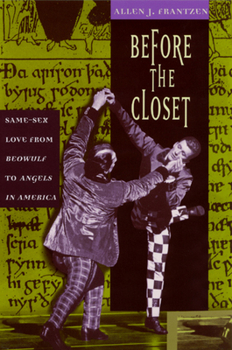Before the Closet: Same-Sex Love from Beowulf to Angels in America
Select Format
Select Condition 
Book Overview
Allen J. Frantzen challenges the long accepted view that the early Middle Ages tolerated and even fostered same-sex relations and that intolerance of homosexuality developed only late in the medieval period. Frantzen shows that in early medieval Europe, the Church did not tolerate same-sex acts, in fact it was an age before people recognized the existence--or the possibility--of the "closet." With its ambitious scope and elegant style, Before the Closet sets same-sex relations in Anglo-Saxon sources in relation to the sexual themes of contemporary opera, dance, and theatre. Frantzen offers a comprehensive analysis of sources from the seventh to the twelfth century and traces Anglo-Saxon same-sex behavior through the age of Chaucer and into the Renaissance. "Frantzen's marvelous book . . . opens up a world most readers will never have even known was there. It's a difficult topic, but Frantzen's comprehensive, readable and even wryly funny treatment makes this an unexpected pleasure."--Publishers Weekly, starred review
Format:Hardcover
Language:English
ISBN:0226260917
ISBN13:9780226260914
Release Date:November 1998
Publisher:University of Chicago Press
Length:380 Pages
Weight:1.40 lbs.
Dimensions:1.1" x 6.3" x 9.3"
Customer Reviews
1 rating
This review appeared in Publishers Weekly 9/14/98 (p. 9)
Published by Thriftbooks.com User , 26 years ago
An exciting account of medieval sexuality? Surprisingly, yes. Loyola University English professor Frantzen brings the "shadows" of same-sex relations ("as closely attached to heterosexual relations as shadows are to their objects") into relief by highlighting their centrality in everything from operatic "trouser roles," in which women dress as men in ambiguous visions of female-female desire, to the dances of Mark Morris, which "offer gay people entertainment and affirmation of the highest order." Turning to his specialty, Frantzen reveals an Anglo-Saxon world much less prudish than we are accustomed to imagining. Where "queer theory" has sought to uncover gay liberation in the past, his "assimilationist" model never limits same-sex desire to genital contact. An engaging and witty guide to tales of cross-dressing saints, legal codes paying much more attention to heterosexual than homosexual misbehavior and references to "Sodom and Gomorrah" less severe than one would expect, he discovers both self-identified same-sex lovers and a culture that allowed them a certain license. Pointing out the nationalist chauvinism of the numerous historians who have labeled William the Conqueror's son gay, Frantzen also makes clear the vast difference between medieval and modern conceptions of sexual identity. Frantzen's marvelous book, concluding with a fascinating discussion of how Angels in America reverses Anglo-Saxon codes of national unification, opens up a world most readers will never have even known was there. It's a difficult topic, but Frantzen's comprehensive, readable and even wryly funny treatment makes this an unexpected pleasure. (0ct.)





